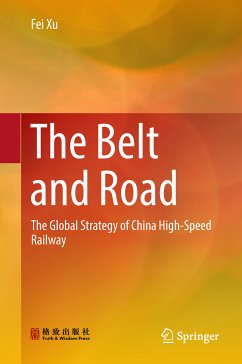
Influence of WTO and Global Dynamics on Trade Flows (eBook, PDF)
A Machine-Generated Literature Overview
Redaktion: Chakraborty, Debashis; Dey, Oindrila
Versandkostenfrei!
Sofort per Download lieferbar
112,95 €
inkl. MwSt.
Weitere Ausgaben:

PAYBACK Punkte
56 °P sammeln!
< p="">This book is a machine-generated literature overview that explores the impact of the World Trade Organization (WTO) on international trade and its development. It looks at international trade before and after 1995 when WTO was established. It highlights the journey of the reciprocity-based reforms under WTO that were expected to help the developing and less developed countries (LDCs) more vis-à-vis their developed counterparts, given the existence of systemic and structural bottlenecks in the latter territories. The enabling steps were further expected to promote exports from developin...
< p="">This book is a machine-generated literature overview that explores the impact of the World Trade Organization (WTO) on international trade and its development. It looks at international trade before and after 1995 when WTO was established. It highlights the journey of the reciprocity-based reforms under WTO that were expected to help the developing and less developed countries (LDCs) more vis-à-vis their developed counterparts, given the existence of systemic and structural bottlenecks in the latter territories. The enabling steps were further expected to promote exports from developing countries and LDCs in line with their comparative advantage patterns, enhance the wage level and in turn, facilitate development of local population. The book showcases how during the first decade after WTO inception, a considerable progress was made for facilitating exports from the lower and lower-middle income countries through crucial provisions like less than full reciprocity (LTFR), Generalized System of Preferences (GSP), support measures under Aid for Trade, zero duty preferences under Special and Differential Treatment (SDT) and so on. However, the pace of WTO reforms has slowed down in the aftermath of the sub-prime crisis in 2008-09 and subsequent focus on formation of regional trade agreements (RTAs). In particular, in the aftermath of Covid-19, a trend towards de-globalization has been noticed, with considerable ramifications for the development of lower-income countries. In this background, there is a need to analyze how the deepening of trade flows and the subsequent de-globalization waves in the global canvas have traversed different paths in different continents and draw the appropriate lessons for the understanding the trade-development interlinkage therein. With insightful observations from the human editors, this machine-generated overview would be of interest to academicians, policy research community, advisory research community, and students ofinternational trade globally.
^
^
Dieser Download kann aus rechtlichen Gründen nur mit Rechnungsadresse in A, B, BG, CY, CZ, D, DK, EW, E, FIN, F, GR, HR, H, IRL, I, LT, L, LR, M, NL, PL, P, R, S, SLO, SK ausgeliefert werden.












